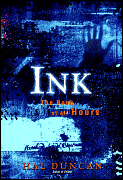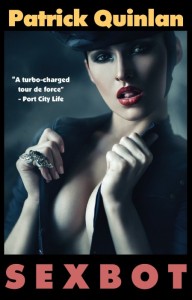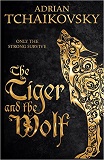
Ink, by Hal Duncan
Book Review by James Michael White
Have you read this book?
Before we talk about Ink, let's explain how we got here, to a second book, in what is, ultimately, but one story. That way we'll have a better understanding, perhaps, of why this second book, carrying on the story of the first, bogs so readily, and so unsatisfactorily, down.
Hal Duncan's "Vellum" may well have been one of the high water marks of 2006 speculative fiction, a story in which demons and angels and humans battle throughout time, alternate universes, and a vaguely similar-seeming world becoming increasingly strange, appearing interleaved with these other realities until, finally, at the end, fragmenting altogether as reality itself starts coming apart.
So far so good, though the ending of this first part of the story, shattered reality, raises some serious misgivings. We'll look at why that is in just a moment. You see, this first book was full of the promise of something different, and it appeared purposefully told by a writer with a good degree of stylistic verve who wove myths and legends and present-day accounts of the horrific into a twisting narrative that seemed destined to go somewhere and mean something.
But "Vellum"'s ending tells us that there is no single underlying reality, that what we take for reality isn't, and tells us, in fact, that the world we've been asked to accept as a central one in a story about a handful of chums looking to make their way in a world that is hostile to them isn't important at all. Not really. There's something deeper going on, here, involving the cant, which is a kind of magical speech whereby reality is altered, and also involving The Book of All Hours, which is a magical book in which the entirety of reality is inscribed. It is the underlying nature of the latter two, that each runs constant throughout all versions of reality, that would seem to provide familiar architecture throughout the two-book story.
Except that kind of architecture isn't at all familiar. It isn't a world per se, just a couple of metaphysical handles. Once "Vellum" declares the end to all reality, such handles do very little to keep readers interested in the shifting fascia of disparate worlds thrown upon them, no matter the flash and panache with which Duncan describes them.
You see, once you've broken reality, where, then, is the reader to hang his hat? Upon what familiar peg is he supposed to rest comfortably the well-worn haberdashery of his literary or worldly acquaintance? Do you leave him deliberately lost in a world of the unfamiliar, or do you pick one of those alternate universes and finally say, "Here, this is the one that my heroes wish to preserve or invent"?
In Ink, the second of The Book of All Hours that presumably completes the tale begun in "Vellum," Duncan seems to have chosen the former, jerking readers back and forth between multiple versions of reality, even using Hamlet's "play within a play" ploy to further hammer upon his themes (we'll get to these in a moment). The end result is one that will probably alienate many readers because it comes off as tiresome and repetitious, a clever trick at last stretched too far, and without the same sense of imminent purpose as in the first novel.
Oh the same characters are present as in Ink as in the first novel, there's Guy Reynard Fox, and Jack, and Seamus Finnan and so on, each supplied with a string of aliases for each version of themselves in each reality, the veneer of their settings and circumstances less important than their purpose, which is, presumably, to forge their own copy of The Book of All Hours and in it rewrite reality to their liking. Consequent to all of this is that we get The Big Idea, which is that all times and places and people are pretty much the same, even the petty fears and distrusts that each has for the other -- which has much bearing on theme, which we'll get to in yet another moment.
You see, all of that multiple-variations-upon-reality is part of the problem: you get the impression that instead of being used to move the story forward, the device of interleaving and juxtaposing seemingly different kinds of stories only to use them to say the same thing stalls matters, makes them repetitious, as if creating these bits was more fun for the author than reading them is for the reader. The great sense of forward motion achieved in Vellum seems watered down in Ink at least by half. All of the great surprises of the two-book story seem to have been expended in the first one, with none seemingly left for Ink. No longer are we surprised that there's a war on in which angels and demons battle for supremacy while a few, a select few, simply want to go their own way and be left alone, or that Seamus Finnan is a kooky guy living in a trailer park, or that he's a mad angel, or Satan, or Prometheus, or a soldier driven mad during WWI, or ... well, you get the point. Repetition, after all. And not the only such.
What's more, Duncan's great theme throughout the two-book work, the one seemingly motivating his primary characters in their quest to rewrite reality, is this: be kind to homosexuals. Or, more aptly put, it's one that rails against the injustice of the establishment (take your pick: it's not just religion) that marginalizes, murders, mistreats and frustrates those who are not like others. Okay. There's some mileage to be wrung out of such a theme, and Duncan wrings it out of the sensational murder of Matthew Shephard, he wrings it out of the even more sensational murders at Columbine, he wrings it out of the murder of García Lorca, he wrings and wrings and wrings and, finally, there's just too much wringing and not enough storytelling. Repetition, you see. How many times can you spin the wheels of the literary automobile before it moves? How long can you expect readers to wait not merely for the illusion of movement, but the actual thing itself?
Ink lacks traction, plain and simple. It's boring. It's repetitious. It goes slipping all over the place, though not without with a little purpose, sure, but oh does it ever have a stretched quality to it, as of a good idea carried too far, and probably in the wrong way.
I may, however, not know what I'm talking about, having read but 208 of 530 pages before giving up for the last time. Yes, I quit reading after 40 pages, then after about a hundred, then, finally, for good. Give Duncan points for ambition, but if not finishing a book is a cardinal sin among reviewers, boring readers is a cardinal sin among authors.
Hal Duncan's "Vellum" may well have been one of the high water marks of 2006 speculative fiction, a story in which demons and angels and humans battle throughout time, alternate universes, and a vaguely similar-seeming world becoming increasingly strange, appearing interleaved with these other realities until, finally, at the end, fragmenting altogether as reality itself starts coming apart.
So far so good, though the ending of this first part of the story, shattered reality, raises some serious misgivings. We'll look at why that is in just a moment. You see, this first book was full of the promise of something different, and it appeared purposefully told by a writer with a good degree of stylistic verve who wove myths and legends and present-day accounts of the horrific into a twisting narrative that seemed destined to go somewhere and mean something.
But "Vellum"'s ending tells us that there is no single underlying reality, that what we take for reality isn't, and tells us, in fact, that the world we've been asked to accept as a central one in a story about a handful of chums looking to make their way in a world that is hostile to them isn't important at all. Not really. There's something deeper going on, here, involving the cant, which is a kind of magical speech whereby reality is altered, and also involving The Book of All Hours, which is a magical book in which the entirety of reality is inscribed. It is the underlying nature of the latter two, that each runs constant throughout all versions of reality, that would seem to provide familiar architecture throughout the two-book story.
Except that kind of architecture isn't at all familiar. It isn't a world per se, just a couple of metaphysical handles. Once "Vellum" declares the end to all reality, such handles do very little to keep readers interested in the shifting fascia of disparate worlds thrown upon them, no matter the flash and panache with which Duncan describes them.
You see, once you've broken reality, where, then, is the reader to hang his hat? Upon what familiar peg is he supposed to rest comfortably the well-worn haberdashery of his literary or worldly acquaintance? Do you leave him deliberately lost in a world of the unfamiliar, or do you pick one of those alternate universes and finally say, "Here, this is the one that my heroes wish to preserve or invent"?
In Ink, the second of The Book of All Hours that presumably completes the tale begun in "Vellum," Duncan seems to have chosen the former, jerking readers back and forth between multiple versions of reality, even using Hamlet's "play within a play" ploy to further hammer upon his themes (we'll get to these in a moment). The end result is one that will probably alienate many readers because it comes off as tiresome and repetitious, a clever trick at last stretched too far, and without the same sense of imminent purpose as in the first novel.
Oh the same characters are present as in Ink as in the first novel, there's Guy Reynard Fox, and Jack, and Seamus Finnan and so on, each supplied with a string of aliases for each version of themselves in each reality, the veneer of their settings and circumstances less important than their purpose, which is, presumably, to forge their own copy of The Book of All Hours and in it rewrite reality to their liking. Consequent to all of this is that we get The Big Idea, which is that all times and places and people are pretty much the same, even the petty fears and distrusts that each has for the other -- which has much bearing on theme, which we'll get to in yet another moment.
You see, all of that multiple-variations-upon-reality is part of the problem: you get the impression that instead of being used to move the story forward, the device of interleaving and juxtaposing seemingly different kinds of stories only to use them to say the same thing stalls matters, makes them repetitious, as if creating these bits was more fun for the author than reading them is for the reader. The great sense of forward motion achieved in Vellum seems watered down in Ink at least by half. All of the great surprises of the two-book story seem to have been expended in the first one, with none seemingly left for Ink. No longer are we surprised that there's a war on in which angels and demons battle for supremacy while a few, a select few, simply want to go their own way and be left alone, or that Seamus Finnan is a kooky guy living in a trailer park, or that he's a mad angel, or Satan, or Prometheus, or a soldier driven mad during WWI, or ... well, you get the point. Repetition, after all. And not the only such.
What's more, Duncan's great theme throughout the two-book work, the one seemingly motivating his primary characters in their quest to rewrite reality, is this: be kind to homosexuals. Or, more aptly put, it's one that rails against the injustice of the establishment (take your pick: it's not just religion) that marginalizes, murders, mistreats and frustrates those who are not like others. Okay. There's some mileage to be wrung out of such a theme, and Duncan wrings it out of the sensational murder of Matthew Shephard, he wrings it out of the even more sensational murders at Columbine, he wrings it out of the murder of García Lorca, he wrings and wrings and wrings and, finally, there's just too much wringing and not enough storytelling. Repetition, you see. How many times can you spin the wheels of the literary automobile before it moves? How long can you expect readers to wait not merely for the illusion of movement, but the actual thing itself?
Ink lacks traction, plain and simple. It's boring. It's repetitious. It goes slipping all over the place, though not without with a little purpose, sure, but oh does it ever have a stretched quality to it, as of a good idea carried too far, and probably in the wrong way.
I may, however, not know what I'm talking about, having read but 208 of 530 pages before giving up for the last time. Yes, I quit reading after 40 pages, then after about a hundred, then, finally, for good. Give Duncan points for ambition, but if not finishing a book is a cardinal sin among reviewers, boring readers is a cardinal sin among authors.
|
Click here to buy Ink, by Hal Duncan on Amazon
|
Ink, by Hal Duncan on Amazon

| More Books You Might Like |
Comment on Ink, by Hal Duncan
| Comments on Ink, by Hal Duncan |
| There are no comments on this book. |




